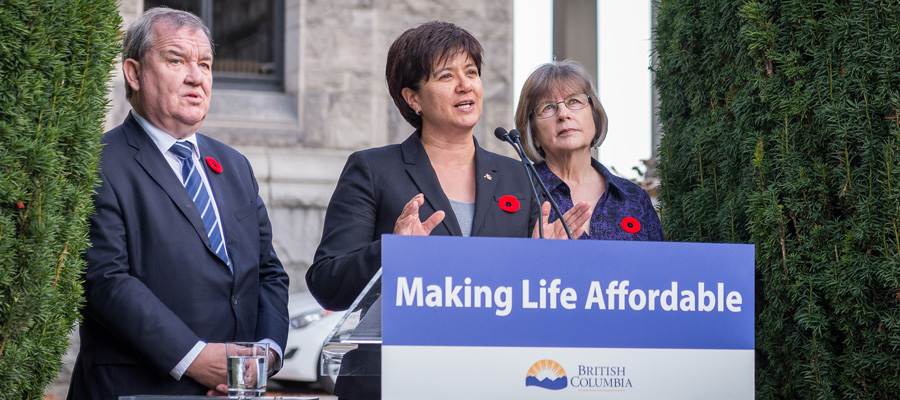Tackling poverty in BC: Celebrating how far we’ve come and looking ahead

As I flipped my calendar over to a new year, I thought about the work the current provincial government has done: 2018 was a year where many initiatives were introduced—initiatives that provide steps along the path to an accountable, bold and comprehensive poverty reduction plan. This is something to celebrate. Given the depth of the problem, much remains to be done to lift people out of poverty, but the government is starting to rebuild in a significant way.
It’s no secret that I’ve been critical of the government’s pace of action—and I will continue to be critical while people are living in the depths of poverty in BC. But I acknowledge that it is harder to build good, long-lasting public services than it is to destroy them, and our province faces many urgent challenges. So I welcome the government’s effort to strengthen community through progressive policy change, and I urge them not to stop until everyone is fully included in our communities.
Housing and child care priorities welcomed
Looking back, one of the highlights of the year was witnessing unanimous support for the first-ever poverty reduction legislation in British Columbia in November, which embedded targets and timelines to reduce poverty in law. The legislation also promises action to prevent and reduce the depth and breadth of poverty and entrenches Indigenous human rights as a foundation.
Earlier in the year, the 2018 BC Budget brought significant investments in housing and child care as the priorities over the year, and British Columbians are already feeling the impact.
I welcome the government’s effort to strengthen community through progressive policy change, and I urge them not to stop until everyone is fully included in our communities.
The first steps in housing focused on those most marginalized, and the government has now completed or is developing more than 2,000 modular housing units in 22 communities. However, the first-ever provincial homelessness count launched by the government and released in December found 7,655 homeless people in BC, highlighting the continued and sustained effort needed. Further investment has been made recently in affordable rental housing from the overall $6.6 billion committed over 10 years. We also welcome targeted action in providing housing for women and children escaping domestic violence and for Indigenous people, both on- and off-reserve.
Through a commitment of $1 billion over three years, child care fees for families have been reduced through the Child Care Fee Reduction Initiative and the Affordable Child Care Benefit, more quality spaces are being built and wages have gone up for early childhood educators. Now parents of 2,000 children throughout BC are experiencing the joy of $10-a-day childcare through the recently launched prototype program.
Health, minimum wage and inequality measures also had impact
The Ministry of Health has also taken proactive measures during the past year with urgent primary care centres launching in multiple communities, improved care for seniors in residential care and home support, and the elimination and reduction of prescription drug deductibles for 240,000 low-income families. MSP payments have now been cut in half and will be eliminated in 2020. As well, landmark legislation introduced in November ends contract-flipping and restores stability and fairness to health care workers. Moving forward, as community health care centres start rolling out, there is a significant opportunity to connect services and supports to address the social determinants of health.
Early steps in access to education included restoring tuition-free adult basic education and English-language learning programs, and removing tuition fees for all former youth in care. More recently, the Ministry of Advanced Education, Skills, and Training has announced investments in skills training and employment services for survivors of violence and abuse, and older workers, including the necessary wrap-around supports such as childcare, transportation, disability supports, and counselling.
For the working poor, which is, in fact, most of those in poverty in BC, news of the minimum wage increase last year was welcome. Now at $12.65 per hour, there will be annual increases to the minimum wage until we reach $15.20 per hour in 2021. Unfortunately, despite the recommendation from the Fair Wages Commission, piece-rate farmworkers are still exempt from the minimum wage. Although these workers have recently had a percentage increase in line with the minimum wage increase, this exemption must be eliminated to ensure that the minimum wage is the basic floor for all workers.
Despite significant movement on comprehensive measures to reduce the breadth of poverty, there are big gaps that remain.
As well as tackling poverty, the government has taken measures to address the increasing and damaging inequality in BC. The speculation and vacancy tax—targeting those using housing as a commodity rather than a home—and the additional school tax on properties valued at more than $3 million are important initiatives to provide necessary redistribution of wealth.
However, despite significant movement on comprehensive measures to reduce the breadth of poverty, there are big gaps that remain and must be filled by the two bold measures identified by the BC Poverty Reduction Coalition.
Rent controls and income increases still critical to fight poverty
First, we need to see an immediate increase to income- and disability-assistance rates in the 2019 BC Budget and a longer-term commitment to provide adequate rates that match the basic cost of living. The increase of $100 to welfare and disability rates back in September 2017 as one of the first initiatives from the government was a much needed first step after the rates had been frozen for a decade; but basic welfare remains less than half the poverty line, maintaining deep poverty for those who find themselves in need.
Enhancing income supports for families is also necessary. It is little known that BC is the only province in Canada that cuts off our child benefit at age six instead of age 18, thus providing far less support over a child’s lifetime than other provinces. The federal government can attribute much of their poverty reduction success to their improvements to the federal child benefit, so the provincial government should follow suit and take up this opportunity.
The second critical, bold initiative is tying rent control to the unit rather than the tenant. As I have said elsewhere, without rent control tied to the unit, many of the government’s policy changes will not have the beneficial impact expected or hoped for. The living wage calculation last year captured this outcome clearly as the cost of living went up because decreases to childcare and MSP costs were surpassed by increasing rents. It is disappointing that the recent recommendations from the government’s Rental Housing Task Force explicitly recommend against this, and I urge the government to reconsider.
Rebuilding may be slow, but the vision is important throughout—from the foundation to the end. We need to see the government’s current focus on “affordability” shift to an explicit vision based on values of humanity and community. Affordability individualizes the issues, while the vision of collectivity and connectivity leads to the strong public services we need to ensure that everyone is fully included in our communities.
It is critical to hold the government to that vision so that all their actions lead there.
As I look forward, I celebrate the rebuilding efforts of this government during the past year, and I hope for strong action to tackle deep poverty in BC in the 2019 Budget.
—
To email the Minister of Social Development & Poverty Reduction in support of bold action in BC Budget 2019, please visit ABCPlan.ca.
Trish Garner is the community organizer with the BC Poverty Reduction Coalition. The CCPA-BC is a founder and current member of the Coalition, and has conducted extensive research on poverty in BC.
This piece originally appeared in the Georgia Straight.
Topics: Employment & labour, Health care, Housing & homelessness, Poverty, inequality & welfare, Provincial budget & finance


